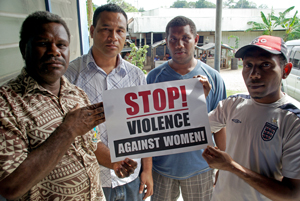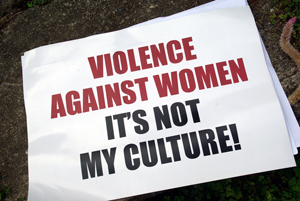More than 50 male community leaders have been trained as advocates against violence and sexual abuse against women in Solomon Islands under an innovative approach led by Asia–Pacific NGO Live and Learn.
Live and Learn, with funding of A$100,000 from Australia for their Men Against Violence Against Women (MAVAW) project, is training leaders in communities in and around Honiara to recognise gender-based violence and its causes, and to work to change attitudes to it in their community.
Haikiu Baibe is the Country Manager for Live and Learn Solomon Islands.
'Domestic violence or gender violence is often seen as a women's issue,' he says. 'But this is a social issue, an issue for everyone in the community.
'Women's organisations have taken the lead so far, but we want to take a different approach. It's time for men to stand up and advocate for this issue.'
Around 64 per cent of women aged between 15 and 49 in Solomon Islands experience physical or sexual violence in their lifetime. The World Bank ranks the country as one of the worst in the world for gender-based violence.
Project coordinator Ellison Sau says that after identifying and training more than 50 community leaders this year alone, his work is just beginning.
'The project is quite new and we are dealing with long-standing problems in the community,' he says. 'It will take time for people to change their attitude towards violence. Many people grow up witnessing violence against women so they see it as a normal part of life.
'But the impact we can have on the leaders is that they start to see the importance of why they really need to do this. It should be part of their job as leaders.'
Ellison has also been working with church leaders to educate them about gender-based violence so they can share the lessons with their congregation.
'We've also trained some youth leaders and they will talk to the other young people in their communities and share the knowledge,' he says. 'We're showing them another perspective on the issue, opening their eyes.'
Haikiu Baiabe says without Australia's assistance, the project could never had has such an important impact.
'Without Australia's support, we couldn't have started in the first place,' he says. 'A paradigm shift within the Solomon Islands context is not easy, but with this assistance, we're making headway.
'The important thing is that men are dealing with this issue, an issue that might not be a problem for every male, but it begins a discussion about all issues about men. It's a space to take the lead and start an ongoing community discussion about this important issue.'


